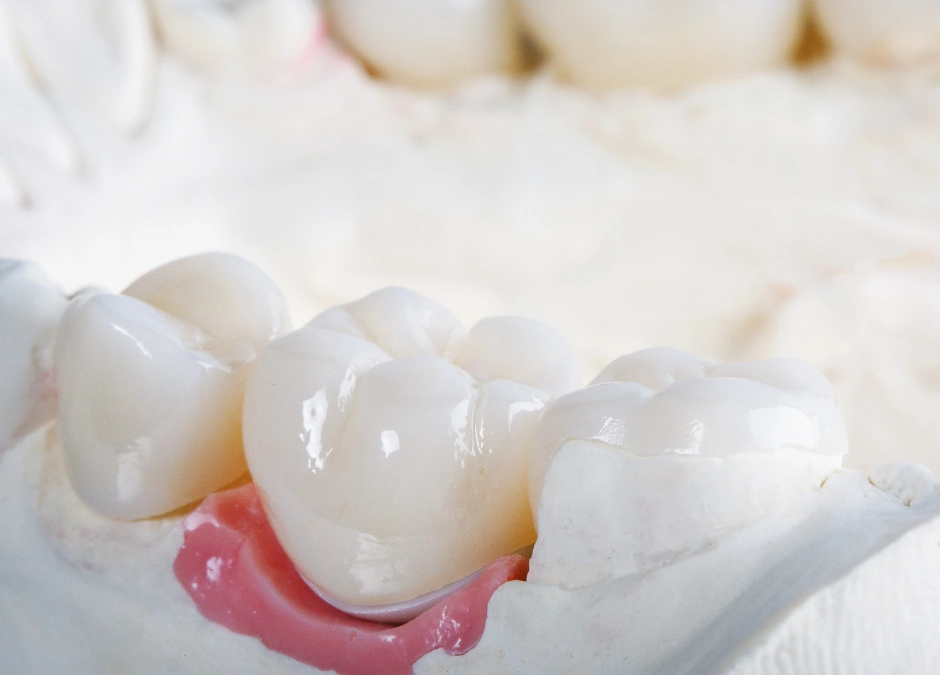Dental crowns, often referred to simply as “crowns,” are essential components of modern dentistry. They serve as protective caps that cover a damaged or weakened tooth, restoring its strength, function, and aesthetics. If you’ve been told you need a dental crown or are simply curious about the different types available, you’ve come to the right place. This article will delve into everything you should know about different dental crown types, helping you make informed decisions about your oral health.
Understanding Dental Crowns
Dental crowns are meticulously crafted dental prosthetics tailored to fit precisely over a prepared tooth. These versatile dental tools fulfil a multifaceted role in modern dentistry, addressing crucial dental concerns with finesse.
- Protection: A primary function of dental crowns is safeguarding fragile or compromised teeth from further deterioration. Crowns entirely encase the tooth and act as sturdy shields, preventing decay and fractures and prolonging the tooth’s lifespan.
- Restoration: Beyond protection, crowns are instrumental in restoring a damaged tooth’s form and function. They meticulously replicate the original tooth’s shape, size, and appearance, enhancing its structural integrity and aesthetic appeal.
- Support: Dental crowns often rescue teeth that have undergone root canal therapy or feature extensive fillings. In such cases, crowns provide essential reinforcement, ensuring the tooth can continue effectively serving its purpose.
Now that we understand their importance let’s explore the different types of dental crowns available in the world of dentistry.
Porcelain Crowns
Porcelain crowns, also called ceramic crowns, reign supreme as the top choice for restoring frontal teeth in dental practice. Their unrivalled popularity stems from their remarkable ability to replicate the natural look of teeth. These crowns are crafted with meticulous precision and are tailor-made to harmonise seamlessly with the shade and contour of your existing teeth, rendering them virtually indistinguishable. For individuals who place a premium on aesthetics, porcelain crowns emerge as a compelling choice.
Pros:
- Natural Appearance: Porcelain crowns deliver an exceptionally lifelike appearance, blending seamlessly with your natural teeth.
- Biocompatible and Hypoallergenic: They are biocompatible, posing a minimal risk of adverse reactions, and are suitable for individuals with metal allergies.
- Durable and Long-lasting: While not as robust as metal crowns, porcelain crowns still offer substantial durability and longevity, ensuring reliable performance.
Cons:
- Less Durable than Metal Crowns: Porcelain crowns, although durable, may not withstand heavy biting forces as effectively as metal alternatives.
- Susceptible to Chipping or Fracturing: Under intense biting pressure, porcelain crowns can be susceptible to chipping or fracturing.
Metal Crowns
Metal crowns are known for their exceptional durability and strength. They are typically made from alloys containing gold, platinum, or other metals. While they may not be as aesthetically pleasing as porcelain crowns, they are an excellent choice for molars and teeth that require heavy chewing and grinding.
Pros:
- Exceptional Durability: Metal crowns boast exceptional durability and an extended lifespan.
- Minimal Tooth Structure Removal: Metal crowns require minimal tooth structure removal during preparation.
- Resistant to Wear and Tear: They exhibit outstanding resistance to wear and tear.
- Ideal for Posterior Teeth: Metal crowns are particularly well-suited for use on posterior teeth.
Cons:
- Less Aesthetically Appealing: Metal crowns may be less aesthetically appealing due to their metallic appearance.
Not Suitable for Metal Allergies: They may not be suitable for individuals with metal allergies due to their metal composition.
Porcelain-Fused-to-Metal (PFM) Crowns
Porcelain-fused-to-metal crowns are a combination of the strength of metal with the aesthetics of porcelain. These crowns have a metal substructure for stability and a porcelain outer layer for a natural appearance. These dental crowns are versatile and can be used for both front and back teeth.
Pros:
- Strong and Durable: Porcelain-fused-to-metal crowns combine strength and durability like metal crowns.
- Enhanced Aesthetics: These crowns are more aesthetically pleasing thanks to their porcelain outer layer.
- Versatile: Suitable for addressing a wide range of dental conditions.
Cons:
Potential for Dark Line: A dark line may emerge near the gum line over time due to the underlying metal becoming visible.
All-Ceramic Crowns
All-ceramic crowns are made completely out of ceramic materials, balancing strength and aesthetics. They are an excellent choice for restoring front teeth. They are preferred by those who want a natural-looking smile without the metal substructure of PFM crowns.
Pros:
- High Aesthetic Appeal: All-ceramic crowns offer high aesthetic appeal with no visible metal, ensuring a natural look.
- Biocompatible and Hypoallergenic: They are biocompatible and suitable for individuals with metal allergies.
- Excellent Durability: All-ceramic crowns are known for their excellent durability.
Cons:
Slightly More Expensive: They tend to be slightly more expensive than porcelain-fused-to-metal crowns.
Zirconia Crowns
Zirconia crowns are best known for their exceptional durability and strength. They are made from a type of ceramic called zirconium oxide, which is prized for its toughness. Zirconia crowns are popular for front and back teeth due to their strength and natural appearance.
Pros:
- Exceptional Durability: Zirconia crowns excel in durability, ensuring long-lasting performance.
- High Aesthetic Appeal: They offer highly aesthetic and natural-looking results.
- Biocompatible and Hypoallergenic: Zirconia crowns are biocompatible, making them suitable for those with metal allergies.
- Minimal Tooth Removal: They require minimal tooth removal during the preparation process.
Cons:
- Slightly More Expensive: Zirconia crowns may cost slightly more than other options.
Choosing the Right Dental Crown for Your Smile
Dental crowns play a crucial role in modern dentistry, offering a range of solutions for damaged or weakened teeth. The choice of the right crown type depends on factors such as the location of the tooth, the patient’s aesthetic preferences, and their budget.
Whether you opt for the natural appearance of porcelain crowns, the durability of metal crowns, the versatility of porcelain-fused-to-metal crowns, the aesthetic appeal of all-ceramic crowns, or the strength of zirconia crowns, consulting with a qualified dentist is essential.
If you need dental crown services or any other dental care in Australia, consider contacting King Street Dental. Our motivated and skilled team of professionals is dedicated to providing top-notch dental care, ensuring your oral health and well-being. Contact us today to schedule an appointment and discover how King Street Dental can help you achieve a healthy and confident smile.

